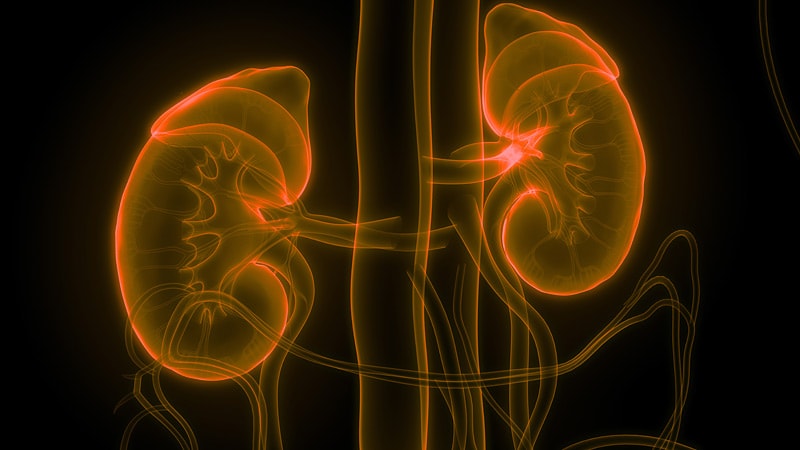Importance of Early Screening for Chronic Kidney Disease Advocated by Experts
Core Concepts
Early screening for chronic kidney disease is crucial to prevent late diagnosis and improve patient outcomes.
Abstract
The article emphasizes the significance of early screening for chronic kidney disease to prevent late diagnosis and improve patient outcomes. It highlights the importance of identifying risk factors, proper management, and the role of primary care physicians in screening and referral. Key insights include:
Advocacy for early screening to reverse the trend of late diagnosis.
Factors indicating the need for kidney disease screening.
Similarities between kidney and cardiovascular risk factors.
Diagnostic criteria for chronic kidney disease.
Importance of glomerular filtration rate and albuminuria in screening.
Strategies for reducing cardiovascular risk in patients with chronic kidney disease.
Guidelines for managing hypertension, lipid control, and diabetes in patients with kidney disease.
The impact of drug-based therapy on kidney disease progression.
Criteria for referral to a specialist and expectations from family doctors and nephrologists in managing chronic kidney disease.
Experts Call for Early Screening for Chronic Kidney Disease
Stats
Chronic kidney disease develops in 15% of the adult population in Spain.
80% of nephrology cases referred to specialists come from primary care.
14% of patients seen in primary care in Spain have chronic kidney disease.
Quotes
"We need to head off this trend toward late diagnosis. As the disease progresses, it significantly increases cardiovascular risk and leads to higher mortality, going on dialysis, transplants, etc." - Teresa Benedito
"Empagliflozin is not currently indicated for chronic kidney disease in adults. This sodium-glucose cotransporter-2 inhibitor delays kidney disease and reduces morbidity." - Roberto Alcázar
Key Insights Distilled From
by Javier Cotel... at www.medscape.com 07-17-2023
https://www.medscape.com/viewarticle/994446
Deeper Inquiries
How can the healthcare system encourage more proactive screening for chronic kidney disease?
To encourage more proactive screening for chronic kidney disease, the healthcare system can implement several strategies. Firstly, raising awareness among healthcare professionals and the general public about the importance of early screening is crucial. This can be achieved through educational campaigns, seminars, and training programs. Additionally, incorporating routine kidney function tests into regular health check-ups can help in early detection. Healthcare providers can also utilize electronic health records to flag patients with risk factors for kidney disease, prompting them to undergo screening. Moreover, offering incentives or rewards for healthcare facilities that meet screening targets can motivate them to prioritize chronic kidney disease screening.
What are the potential drawbacks or limitations of early screening for chronic kidney disease?
While early screening for chronic kidney disease is essential, there are potential drawbacks and limitations to consider. One limitation is the risk of overdiagnosis, leading to unnecessary anxiety and medical interventions for patients with mild or stable kidney disease. Additionally, false-positive results from screening tests can result in unnecessary follow-up tests and treatments, increasing healthcare costs. Early screening may also lead to labeling and stigmatization of individuals with kidney disease, impacting their quality of life. Furthermore, resource constraints and limited access to follow-up care for individuals identified through screening can pose challenges in managing the disease effectively.
How can advancements in technology improve the accuracy and efficiency of chronic kidney disease screening?
Advancements in technology offer promising opportunities to enhance the accuracy and efficiency of chronic kidney disease screening. One key advancement is the development of point-of-care testing devices that allow for rapid and convenient assessment of kidney function markers, such as creatinine and albuminuria, in various healthcare settings. Telemedicine and remote monitoring technologies enable healthcare providers to remotely monitor patients' kidney function and provide timely interventions. Artificial intelligence and machine learning algorithms can analyze large datasets to identify patterns and predict the risk of kidney disease progression, aiding in personalized patient care. Furthermore, wearable devices and mobile applications can empower individuals to track their kidney health parameters regularly and engage in self-management strategies. These technological advancements have the potential to revolutionize chronic kidney disease screening by improving early detection, monitoring disease progression, and optimizing treatment outcomes.
0
